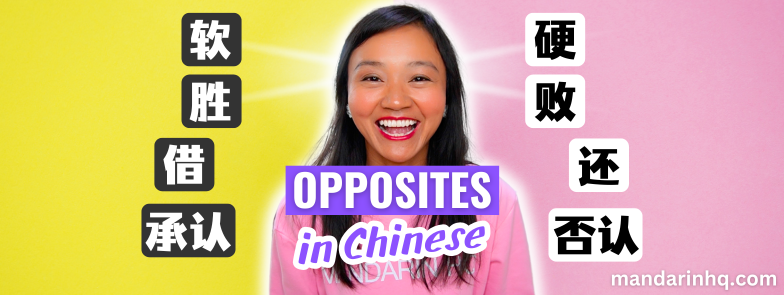When you're learning Chinese, getting a solid grasp of opposites (反义词 — fǎnyìcí) is helpful. Why? Because learning in pairs helps your brain create stronger memory connections and lets you express a broader range of ideas more easily.
In this post, we’ll explore 100 essential Chinese antonym pairs, with characters, pinyin, and meanings to make studying simple and effective. These cover everything from common descriptions to abstract concepts — so no matter your level, there’s something here for you!
 The List: 100 Must-Know Chinese Opposites
The List: 100 Must-Know Chinese Opposites
Here’s are some of the opposites included in the PDF.
| 中文 | Pinyin | English | 中文 | Pinyin | English |
|---|---|---|---|---|---|
| 深 | shēn | Deep | 浅 | qiǎn | Shallow |
| 宽 | kuān | Wide | 窄 | zhǎi | Narrow |
| 软 | ruǎn | Soft | 硬 | yìng | Hard |
| 直 | zhí | Straight | 弯 | wān | Curved |
| 轻松 | qīngsōng | Relaxed | 紧绷 | jǐnbēng | Tense |
| 清楚 | qīngchǔ | Clear | 模糊 | móhu | Blurry |
| 强壮 | qiángzhuàng | Strong (body) | 虚弱 | xūruò | Weak |
| 凉 | liáng | Cool | 暖 | nuǎn | Warm |
| 喜剧 | xǐjù | Comedy | 悲剧 | bēijù | Tragedy |
| 成熟 | chéngshú | Mature | 幼稚 | yòuzhì | Immature |
...and 90 more powerful pairs just like these.
 Why Learn Antonyms in Mandarin?
Why Learn Antonyms in Mandarin?
Contextual learning: Knowing both ends of a spectrum (e.g., "hot" and "cold") makes the meaning clearer and easier to remember.
Improved speaking fluency: You’ll be able to contrast ideas and explain yourself better.
Boosted writing and comprehension: Antonyms help you recognize subtle meaning shifts in conversations, books, or articles.
 Fun Study Tips
Fun Study Tips





这汤太咸了,你有没有淡一点的?
(Zhè tāng tài xián le, nǐ yǒu méiyǒu dàn yìdiǎn de?)
“This soup is too salty, do you have a lighter one?”
You might also find these posts interesting:

